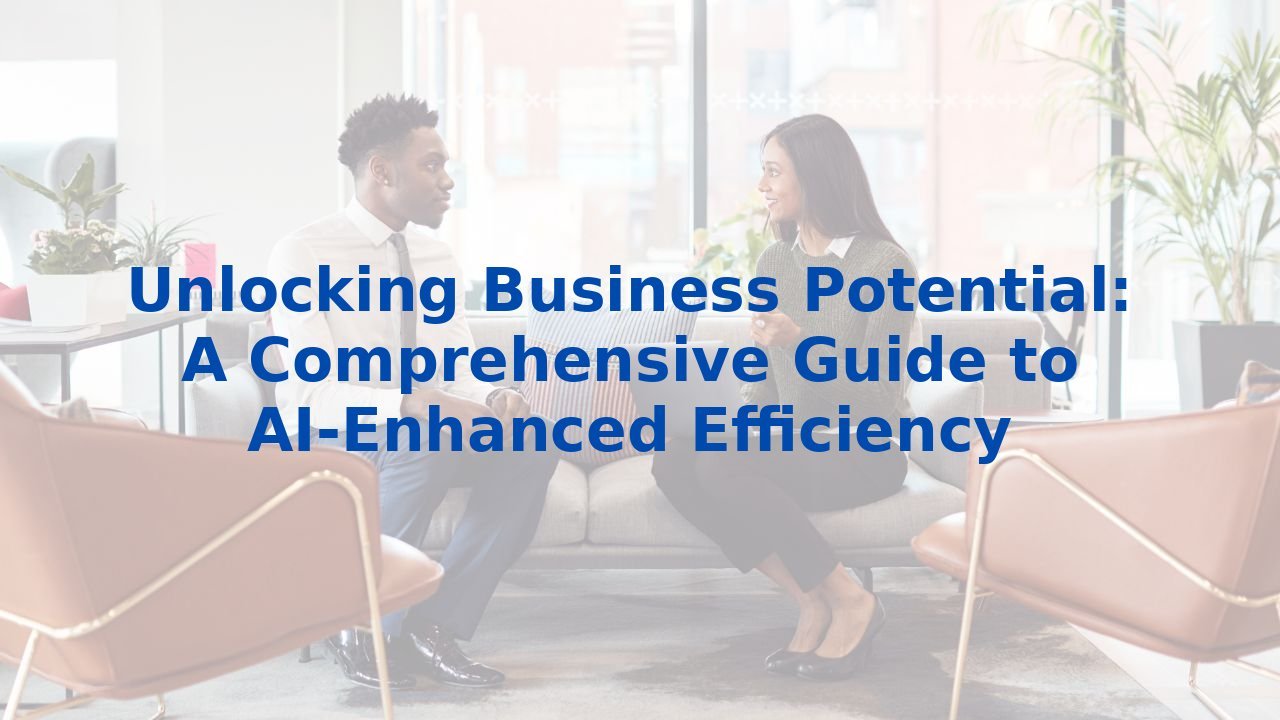Unlocking Business Potential: A Comprehensive Guide to AI-Enhanced Efficiency
Unlocking Business Potential: A Comprehensive Guide to AI-Enhanced Efficiency
In a world where change is the only constant, businesses must continuously adapt to thrive. One of the most transformative tools in this pursuit is Artificial Intelligence (AI). By enhancing efficiency across various business processes, AI can significantly impact an organization’s overall performance. In this guide, we'll explore how to leverage AI to unlock your business's potential.
1. Data Analysis and Decision Making
Data is the lifeblood of any organization. The ability to analyze vast amounts of information quickly and effectively can define success or failure. AI excels in this domain, processing large datasets with remarkable speed and accuracy. It provides insights that support better decision-making by revealing trends, predicting outcomes, and identifying root causes.
Imagine your sales team being equipped with insights that pinpoint which customers are most likely to convert. This precision allows organizations to focus their efforts where they’ll yield the highest impact, driving growth and fostering stronger customer relationships.
2. Process Building and Automation
Repetitive tasks can drain resources and morale. AI transforms this landscape by automating manual workloads, freeing up employees to focus on more strategic initiatives. AI-driven process building can analyze historical data and design workflows that are efficient and tailored to your organization’s needs.
Consider how AI might construct new workflows from disparate data sources like CRM or ERP systems. The result? A seamless, visualized process that enhances both clarity and execution—all while minimizing human error.
3. Process Optimization
With AI, organizations can illustrate their processes in a dynamic environment. Using machine learning and deep learning, businesses can simulate workflows, calculating key performance indicators (KPIs) such as costs and lead times effortlessly. This simulation helps uncover bottlenecks, allowing for preemptive strategies rather than reactive fixes.
By monitoring historical data, AI can identify anomalies—like unusual delays or unexpected errors—allowing companies to act proactively, fostering a culture of continuous improvement.
4. Customer Service and Experience
The way businesses engage with customers is evolving. AI is at the forefront of this transformation, automating routine inquiries with speed and efficiency. Imagine chatbots that can handle basic queries while AI analyzes customer feedback to enhance services continually.
The ability to monitor customer requests in real-time allows for a more personalized and timely response, creating a customer experience that is both positive and memorable.
5. HR and Recruitment
Human resources is another area ripe for AI transformation. By leveraging AI, organizations can increase objectivity in hiring processes and enrich the employee experience. AI can help evaluate pay scales, consolidate performance data, and predict attrition trends, all while allowing HR to focus more on individuals rather than administrative tasks.
Furthermore, AI aids in candidate selection and onboarding processes, ensuring that employees receive tailored career paths that align with their skills and aspirations, ultimately benefiting the entire organization.
Benefits of AI in Business Processes
The benefits of AI are vast, but they can generally be distilled into a few key points:
1. Improved Efficiency: AI automates routine tasks, which minimizes human intervention and error, leading to heightened productivity.
2. Enhanced Decision Making: AI’s predictive recommendations allow for informed decisions, utilizing both structured and unstructured data forms.
3. Real-Time Monitoring: AI systems offer real-time insights into processes, allowing businesses to tackle issues as they arise.
4. Cost Reduction: The optimization of processes leads to significant resource savings.
5. Compliance and Risk Management: AI can detect anomalies and ensure adherence to regulatory requirements, safeguarding the organization from potential risks.
The Role of Employee Training in AI Implementation
While AI offers transformative possibilities, its success lies in equipping employees with the right skills. Training your workforce on AI systems is crucial to harnessing their full potential. Here’s how:
1. Understanding AI Capabilities: Training ensures employees know how to leverage AI tools effectively and understand their limitations, leading to accurate decision-making.
2. Adaptability: Well-trained employees can swiftly adapt to changes, keeping organizations agile in a fast-paced landscape.
3. Improved Collaboration: Training fosters a harmonious relationship between employees and AI, ensuring actionable insights are effectively translated into practice.
4. Enhanced Problem-Solving Skills: Equipped employees can identify where AI may fall short and address those gaps creatively.
Conclusion
As AI continues to reshape the business landscape, organizations that embrace these technologies stand to gain a significant competitive edge. By enhancing processes, decision-making, and customer interactions, AI propels businesses toward greater efficiency and growth. Yet, the journey doesn’t end there. Equipping employees with the necessary training to navigate this AI-driven world is essential for unlocking its true potential. Commit to understanding and applying these principles, and you’ll witness your business transform into a powerhouse of innovation and efficiency.
For those looking to develop AI skills in their workforce, consider exploring extensive training programs tailored for diverse roles within your organization—because a well-trained team is the cornerstone of sustained success.



